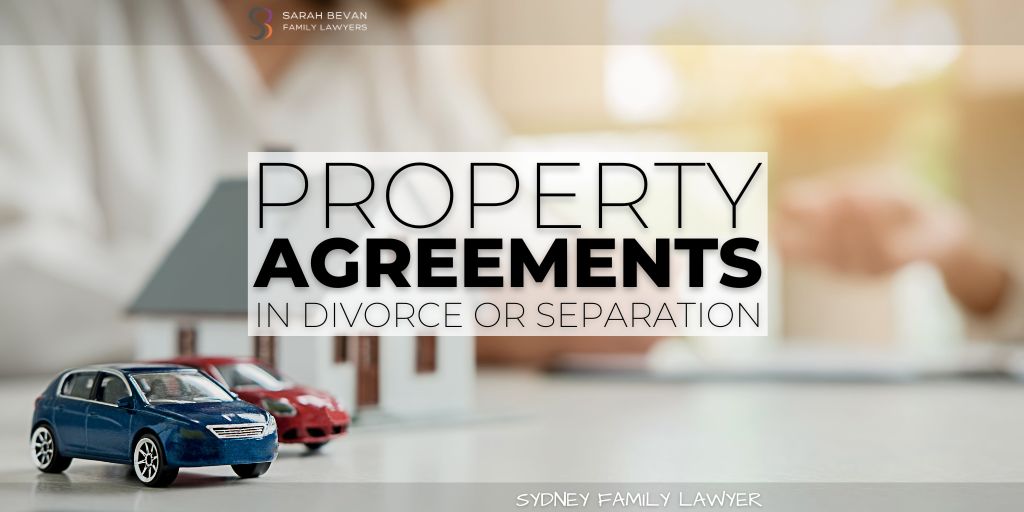- Sydney Family Lawyers
- (02) 9633 1088
- mail@sbfamilylawyers.com.au
Property Agreements when couples separate
What is meant by property in a family law case?
In a family law case, “property” refers to any assets or possessions that a person or couple owns, this is also known as “Property of the relationship”. It includes all assets held by you and your former partner, regardless of whether it is in joint or separate names.
This can include financial assets such as bank accounts, investments, businesses and real estate, as well as personal property such as your home (and the content within), cars, boats, furniture, clothing and jewellery.
In some cases, such as a family business or a partnership, a share in the business or investment needs to be considered or is part of a family trust. In these situations, it’s best to get good quality legal support as it can be very complicated to access the information required that will satisfy all parties.
Superannuation will also need to be disclosed.
The property pool also includes all liabilities (any debt that you or your ex-partner may have accrued individually or while you were together). This includes mortgage debts, credit cards, leasing or hire purchase agreements.
Just because you or your partner acquired assets in your own name before you entered into the relationship, doesn’t mean that it shouldn’t be included in the asset register.
In divorce cases, the court will typically divide the couple’s property equitably, which may not always be a 50-50 split. In some states, the court will also divide marital debt in the same manner as it divides assets.
The court may also consider property that you or your partner have acquired since separation.
What is a property agreement in family law?
A property agreement in family law refers to a legally binding agreement between two parties that outlines how their property will be divided in the event of separation or divorce.
This type of agreement can be made before or during a marriage or de facto relationship and can also be made after separation but before divorce proceedings have begun. It is also called a prenuptial agreement or a cohabitation agreement.
The agreement typically outlines how assets and liabilities will be divided and can include provisions for things like spousal maintenance, child support, and superannuation. It’s important to note that the terms of the agreement must be fair and reasonable, and cannot be discriminatory or against the law. The agreement must also be in writing and signed by both parties.
Property agreements can be useful for couples who want to have more control over how their property will be divided in the event of a separation or divorce, or for couples who have significant assets or liabilities that they want to protect. It’s important to seek legal advice when drafting a property agreement, as a lawyer can help to ensure that the agreement is valid, fair, and legally binding.
The benefit of negotiating a property agreement is that it minimises the cost of lawyers and lengthy court proceedings. It can often be a quicker way toward a solution and allow you to be part of the process rather than having a court-imposed decision mandated to your situation. It is often a smoother process with less emotional impact on the children.
Separation with a de facto spouse
Are the laws different for de facto or same-sex couples in a divorce?
The laws for de facto and same-sex couples can vary depending on the state or country. In some states and countries, de facto and same-sex couples may not have the same legal rights as married couples in terms of property division and other aspects of divorce. However, in recent years, many states and countries have expanded the legal rights of de facto and same-sex couples to more closely align with those of married couples.
In general, de facto and same-sex couples may face additional legal challenges when it comes to issues such as property division and child custody, since their relationships may not be as clearly defined under the law as those of married couples. In this case, a lawyer familiar with the state laws and case law can help navigate the legal complexities.
It’s important to note that the laws are changing quickly and it’s necessary to check the current laws of the state or country where you live, to understand the rights and obligations that apply to you.
Why do you need to seek legal advice in family law?
Seeking legal advice in family law is important for several reasons:
- Understanding the laws: Family law can be complex and can vary depending on the state you live in. A lawyer can help you understand the specific laws and regulations that apply to your case.
- Protecting your rights: A lawyer can advise you on your rights and help you to protect them during the legal process.
- Negotiating settlements: In many cases, it is possible to reach a settlement through negotiation or mediation. A lawyer can help you to negotiate a settlement that is fair and in your best interests.
- Representation in court: If your case goes to court, a lawyer will represent you and advocate for your interests.
- Emotional Support: Family Law cases are emotionally charged, a lawyer can provide emotional support to help you through the process.
Overall, having a legal representation can help to ensure that your rights are protected and that the outcome of your case is as favourable as possible.
Contact our family lawyers for an obligation free introduction call, or make a booking in our online calendar.




